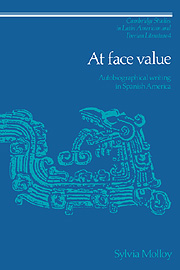Book contents
- Frontmatter
- Contents
- Acknowledgments
- Introduction
- PART I THE SCENE OF READING
- 1 The reader with the book in his hand
- 2 From serf to self: the autobiography of Juan Francisco Manzano
- 3 The theatrics of reading: body and book in Victoria Ocampo
- PART II CHILDHOOD AND FAMILY TALES
- PART III MEMORY, LINEAGE AND REPRESENTATION
- Notes
- Bibliography
- Index
2 - From serf to self: the autobiography of Juan Francisco Manzano
Published online by Cambridge University Press: 14 September 2009
- Frontmatter
- Contents
- Acknowledgments
- Introduction
- PART I THE SCENE OF READING
- 1 The reader with the book in his hand
- 2 From serf to self: the autobiography of Juan Francisco Manzano
- 3 The theatrics of reading: body and book in Victoria Ocampo
- PART II CHILDHOOD AND FAMILY TALES
- PART III MEMORY, LINEAGE AND REPRESENTATION
- Notes
- Bibliography
- Index
Summary
… speech only appears in the text in a fragmented,
wounded state. It is present within it as a “ruin.”
Michel de Certeau, “Montaigne's Of Cannibals”“The lady Doña Beatriz de Justiz, Marchioness Justiz de Santa Ana, wife of Don Juan Manzano, took pleasure every time she went to her famous estate of El Molino in choosing the prettiest Creole girls, when they were ten or eleven years of age; she took them with her and gave them an education suitable to their class and condition so her house was always filled with servants …” [“La Sra. Da. Beatriz de Justiz Marqueza Justiz de Sta. Ana, esposa del Sor. Don Juan Manzano, tenia gusto de cada vez qu. iva a su famosa asienda el Molino de tomar las mas bonitas criollas, cuando eran de dies a onse años; las traia consigo y dándoles una educatión conforme a su clase y condision, estaba siempre su casa llena de criadas …”]
This casual anecdotal beginning, not unlike the opening of so many nineteenth-century novels, is deceptively innocent. For it is not, as might appear, the beginning of a novel told by a third-person narrator of which the Marquesa is the principal character; it is, instead, the beginning of the autobiography of the Marquesa's slave, Juan Francisco Manzano. Nor, as the Spanish original clearly shows, is it a particularly harmonious piece: unsystematic in its spelling, arbitrary in its punctuation, nonchalant in its syntax, this text is, quite obviously, different.
- Type
- Chapter
- Information
- At Face ValueAutobiographical Writing in Spanish America, pp. 36 - 54Publisher: Cambridge University PressPrint publication year: 1991
- 1
- Cited by



